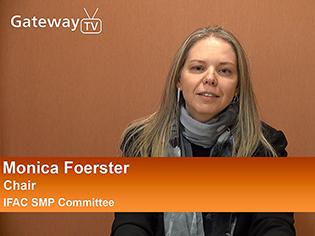IAASB eNews Special Edition: New IAASB Technical Director Seeks to Grow Global Team
The IAASB is pleased to announce the appointment of Matthew Waldron as Technical Director.
In this role, Mr. Waldron works closely with the IAASB Chair to engage senior members of the global accountancy profession, the regulatory community, and other key stakeholders in support of, and to enhance, global public trust; and to manage the international audit and assurance standard-setting program.
Mr. Waldron leads and develops a dynamic team of highly-talented individuals that help influence the direction, shape, and content of leading-edge standard-setting projects. His team operates in a diverse and collegial environment, building strong relations with colleagues and peers who are passionate about international standard setting.
Previously, Mr. Waldron was a Director in the Financial Reporting Policy Group at CFA Institute, where he represented membership interests regarding audit and financial reporting proposals issued by the US Financial Accounting Standards Board, the International Accounting Standards Board, and other regulators and standard setters. Earlier in his career, he also worked for KPMG and PwC. Since 2014, Mr. Waldron has chaired the IAASB’s Consultative Advisory Group, in addition to serving as a member representative since 2007. Under Mr. Waldron’s leadership, the IAASB is now seeking to fill multiple vacancies.
Are you seeking an exceptional professional opportunity that combines your understanding of the public interest role of auditing and assurance standards with your desire to make a difference on a global stage?
The IAASB is seeking two talented individuals to fill a Principal and a Manager position based in New York. These impactful positions require knowledge of audit and assurance, an understanding of standard setting, and strong team work and leadership skills.
For the Principal position, we are looking for an individual with advanced expertise in auditing or assurance, or prior standard-setting experience. As a senior member of the IAASB, this position will be responsible for more technically challenging projects and initiatives as well as providing guidance to managers and support staff.
The Manager, Standards Development and Technical Projects position requires intermediate expertise in auditing or assurance. He or she will support senior IAASB staff on challenging projects while also taking primary responsibility for other important projects and activities.
The IAASB is responsible for global audit and assurance standard setting. Robust audit and assurance standards are fundamental to the way modern societies work, enhancing credibility and trust in a society’s external reporting. The IAASB achieves this through its commitment to advancing audit quality worldwide, developing standards that protect the interests of those who rely on audits, assurance, and other services, and are practicable for those who implement the standards.
The IAASB is supported by a talented team of professionals from different backgrounds, all of whom embrace the opportunities and challenges of collaborating on a global stage. This team assists the IAASB in serving the public interest by setting high-quality international standards, and by facilitating their adoption and implementation. We offer our team a competitive compensation and a superior benefits package, including medical, dental, retirement plans, and annual leave.
We invite you to apply for our open positions by March 31 and join our expert and dedicated team.
The IAASB is one of four independent international standard-setting boards whose operating structures are supported by the International Federation of Accountants. Most standard-setting staff positions for the IAASB and the International Ethics Standards Board for Accountants are based in New York, US. Standard-setting staff positions that support the International Public Sector Accounting Standards Board and International Accounting Education Standards Board are based in Toronto, Canada.




